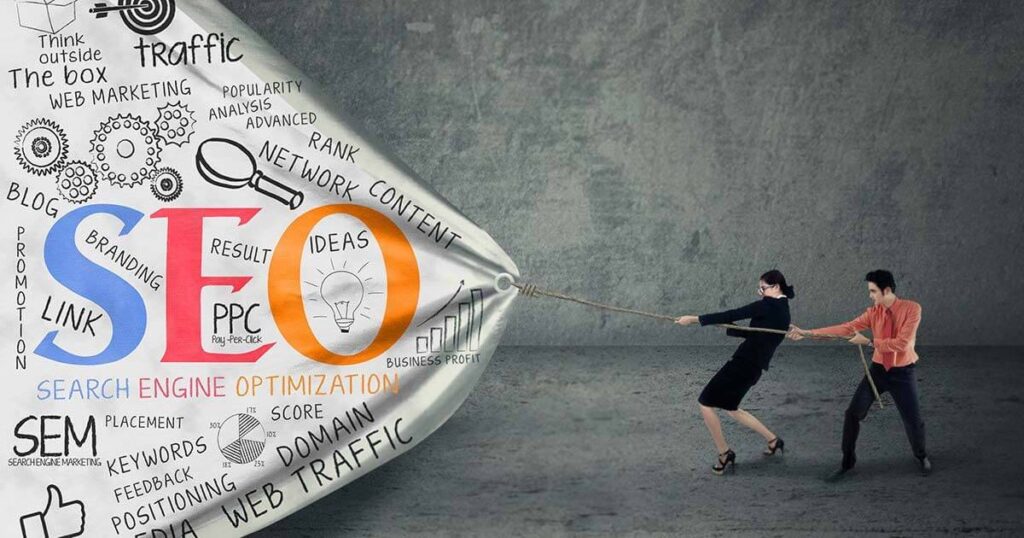It is essential to benefit from good visibility on the web. Optimization for search engines (SEO) aims to position its site at the top of the search results. We synthesized in this article the main SEO concepts to know.
SEO: What is hidden behind optimization for search engines
Optimization for search engines, in English Search Engine Optimization (SEO), one of the most important branches of the Online marketing. The basic principle is very simple: you optimize your content for users and search engines and are rewarded in return by good positioning in search results. The meaning of the SEO lies in its power to make your website more accessible to users, which allows you to considerably attract more attention to your online offer.
The objective of SEO optimization is to guarantee good visibility in natural (or organic) search results, while paid SEO (SEA) guarantees high positioning in sponsored search results thanks to the dissemination of paid ads.
While SEO optimization should allow you to obtain a good positioning in organic search resultsthe SEA ensures a High positioning in non -organic research results Thanks to the broadcasting of paid ads. These two areas are research motors' marketing disciplines (SEM).
Advice
Take a look at our SEO glossary and find out what the most important SEO notions are.
What is SEO's goal?
The main objective is to optimize your website in order to best position it in Google's organic search results, whether it is an online store, an blog (consult our article « Bloggers: Blogs » to learn more about this) or another type of portal. To achieve this, it is essential to adapt the site to the theme and the offer, in particular by focusing on the use of relevant keywords. For example, for a shop selling women's handbags, terms like « buying handbags for women online » or « handbags for women at affordable prices » are crucial. By ranking results for this research, the chances of attracting potential customers to the page are considerably increased.
Advantages and disadvantages of SEO
The primary advantage of natural referencing lies in its good Cost/utility ratio. A good SEO positioning is the indicator of a good site optimization and cannot be purchased as in SEA. Nevertheless, a SEO strategy involves work services, and therefore costs. This is all the more worth if we must first acquire the notions of the SEO. In comparison with keyword advertising with Google ADS and others, financial investment is relatively low. Once Google has noticed that users often visit a site, that they make purchases there according to the offer and that they recommend the store, an online reputation is created and the classification increases!
Another advantage: thanks to many SEO tools, it is possible not only to manage and measure your own success, but also to analyze the competition precisely and to obtain advice from competitors. Tools like Sistrix or Searchmetrics allow for example a detailed SEO analysis of competition.
Of course, SEO also has its drawbacks. The first being that we remain fully dependent on Google. A SEO optimization that bore fruit a few months ago can quickly become obsolete after an algorithm update. In addition, creating an online reputation can be a long and uncertain process, spanning weeks or even months and with difficult costs to foresee. On the other hand, paid announcements produce almost immediate results, but the visibility of the site decreases quickly as soon as the SEA campaigns are interrupted. Optimization for search engines represents a sustainable investment, offering long -term profits.
| SEO advantages | Disadvantages of SEO |
|---|---|
| Economical solution to increase its visibility | Strong dependence on search engines (Google) |
| Allows you to build your online reputation | The results often only appear after several weeks or months |
RankingCoach
Boost your sales thanks to digital marketing by IA
- Improve your ranking on Google without the costs of an agency
- Answer customer opinions and generate publications for networks
- No knowledge of SEO and online marketing required
SEO Optimization: The SEO Off-Page and On-Page
Optimization for search engines can be divided into two major areas: SEO on-page and the SEO off-page. As part of on-page optimization, it is first of all the design and quality of the page itself. The SEO Off-Page encompasses all external actions to the website which indicate to Google that your content may also interest readers from other web pages.
SEO on-page
The SEO on-page includes all optimization measures for search engines that can be set up on your own internal website. This implies the adjustment of the content, the structure and the technique to improve the classification in the research with a high traffic, therefore competitive. By focusing on quality content, this SEO method aims to make the site more attractive for visitors and indexing robots. On-page optimization is the most widespread SEO method in terms of natural referencing.
Overview of the main areas of activity of on-page optimization:
- Content : The goal is to create qualitative and attractive content. SEO content must be relevant and unique; Plagiarism and duplicate content are to be avoided. In particular, use keywords and synonyms.
- Keywords : A complete keyword strategy is essential for successful referencing. When searching for keywords, you must also use synonyms and always write first for readers, not for Google crawlers.
- Structure : Content optimization alone is not enough in online marketing, the structure of the page also must be well neat. The title, paragraphs and lists improve readability, both for users and for search engines.
- Multimedia content: In addition to texts, a page often incorporates images, videos and graphics. The addition of interactive content can stimulate the time of visit and promote the interaction of users. So that Google can index these elements, it is important that file names, titles and alternative descriptions (Alt Text) Images and videos contain relevant keywords.
- Metadata: Metadata, also called meta tags, provide interpretable information by web browsers and search engines. Among the crucial attributes for on-page optimization are the title (Title) and the description (Meta Description).
- Links structure: Internal links play an essential role not only for users, but also for Google, by facilitating navigation on a website. The pages benefiting from a larger number of internal links tend to present better performance. When you optimize the structure of internal links, it is crucial to minimize the length of the path to go to access a given page.
- Technique: Another element is the technical optimization of the website, which includes the use of a programming suitable for search engines. We reveal to you in an article tips to increase the speed of your site, because prolonged loading times send negative signals to Google, just like breakdowns or code errors.
SEO Off-Page
Off-Page optimization includes all measures indirectly linked to your website, that is to say the signals from external pages. If a link directs a page A to a page B, the number of visits on page B will be increased, thus promoting its notoriety. Google takes into account the reputation and relevance of a page in its classification algorithm. This is why backlinks Play a crucial role: they facilitate the navigation from one site to another and thus help to strengthen the notoriety and the positioning of a page in the search results. These links and mentions on other pages or in social networks are therefore an important factor for positioning in the list of search results.
These are the main areas of work of the Off-Page optimization:
- Linkbuilding: Backlinks are among the most influential classification factors, which explains why the creation of backlinks is a significant part of the off-page optimization. They serve as a reference to assess the popularity of a page. It is not just a question of quantity, but above all of the quality of the links.
- Social signals: The “social signals” category includes all indications from social media platforms such as Facebook or Twitter. Positive interactions such as Likes, Sharing and Comments play an important role in the search engines. Companies that are active on social networks also benefit from increased visibility, increased traffic and better customer loyalty.
Advice
Easily optimize your website with Ionos RankingCoach! This gives you useful advice and action recommendations for your website. Make the free SEO control of your website now with Ionos RankingCoach!




